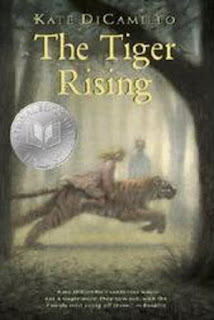Later when I was perusing our bookshelf looking for kids' books to resell, I put it in the stack of books to be sold. She spotted it and pulled it out. "Not this book," she said. "This book is great," so back on the shelf it went.
It's been on my to read list, along with about 200 others for a while, but the other night, after everyone went to bed, I was looking for something light to read, and decided to pull it down and see what was so great about it. It immediately sucked me in. It's about a boy, Rob, who just moved to this small town after the death of his mother. On top of this he is mercilessly picked on by two ogre bully kids. His Dad doesn't appear to be a great support as he is also dealing with the death of his wife. So there I am in the midst of the early chapters, outraged on behalf of this boy, and hating his father for not comforting him and standing up for him. I'm also sad for the boy who is okay with being picked on because it helps him not feel the sadness over his mom. This sadness that he stuffs into an imaginary suitcase. He meets a girl who is also dealing with her own family issues. Family issues that also brought her against her will to this small town. She avoids grieving by being angry all the time. The only other thing I am going to share, is that the book is about these two processing their emotions about death, love, and loss, and it is brilliant.
I recently lost my father, so I have been worried and stressed about how my children are dealing with the death of their first close family member. I ask myself questions like, "Should I take them to the memorial service? Will it be too much sadness for them? How do I help them process their emotions? How can I make sure that they understand that it is okay to be sad?"
After reading this book, I realized that children can and should be allowed to experience grief and sadness, not protected from it as is parental instinct (at least mine), and that in fact, they do it better than we do if we let them. If we don't impose our own thoughts and behaviors and preferences on them, and tell them what to do with this sadness that they feel. Adults are the worst at it. We keep busy to distract ourselves (me, check). We don't talk about it (me again, check), stuffing it in our imaginary suitcase until it bubbles out in different, often unhealthy ways. We self-medicate and/or we cycle through all of the above. We work so hard to protect ourselves from all things unpleasant, and move on as quickly as possible, and we pass that onto our children.
The lesson here is that you can't move on from those feelings until you look them in the face, and call them what they are. You can't move on until you stop running, and let that wave of grief wash over you, and know that it may take a long time for that tide to go out. It's uncomfortable. It's scary. It's sad, but it's natural. It's part of life. We can't run from it. The only real way out is through. Since I can't out run it, and I can't save my children from the wave grief that they will one day have to withstand, the best I can do for them is show them that I can look that wave in the face. I can let it wash over me, and when that tide finally rolls out, I will still be standing.
You can also find me on Goodreads.com as Gretchn_red





No comments:
Post a Comment